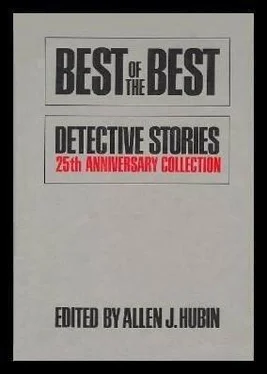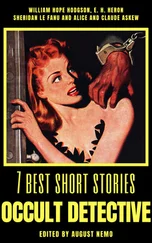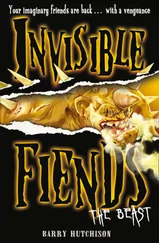Stephen Barr - Best of the best detective stories - 25th anniversary collection
Здесь есть возможность читать онлайн «Stephen Barr - Best of the best detective stories - 25th anniversary collection» весь текст электронной книги совершенно бесплатно (целиком полную версию без сокращений). В некоторых случаях можно слушать аудио, скачать через торрент в формате fb2 и присутствует краткое содержание. Город: New York, Год выпуска: 1971, ISBN: 1971, Издательство: E.P. Dutton & Co., Жанр: Детектив, на английском языке. Описание произведения, (предисловие) а так же отзывы посетителей доступны на портале библиотеки ЛибКат.
- Название:Best of the best detective stories: 25th anniversary collection
- Автор:
- Издательство:E.P. Dutton & Co.
- Жанр:
- Год:1971
- Город:New York
- ISBN:978-0-525-06450-3
- Рейтинг книги:5 / 5. Голосов: 1
-
Избранное:Добавить в избранное
- Отзывы:
-
Ваша оценка:
- 100
- 1
- 2
- 3
- 4
- 5
Best of the best detective stories: 25th anniversary collection: краткое содержание, описание и аннотация
Предлагаем к чтению аннотацию, описание, краткое содержание или предисловие (зависит от того, что написал сам автор книги «Best of the best detective stories: 25th anniversary collection»). Если вы не нашли необходимую информацию о книге — напишите в комментариях, мы постараемся отыскать её.
Best of the best detective stories: 25th anniversary collection — читать онлайн бесплатно полную книгу (весь текст) целиком
Ниже представлен текст книги, разбитый по страницам. Система сохранения места последней прочитанной страницы, позволяет с удобством читать онлайн бесплатно книгу «Best of the best detective stories: 25th anniversary collection», без необходимости каждый раз заново искать на чём Вы остановились. Поставьте закладку, и сможете в любой момент перейти на страницу, на которой закончили чтение.
Интервал:
Закладка:
And James Ezekiel Patch grumbled: “If it’s money you want, young woman—”
“Certainly it’s money I want. But I have something to sell.”
“Ah!” said the Baroness.
“Oh?” said the Professor.
“Hm,” said the antiquarian.
Mr. Queen said nothing, and Miss Porter jealously chewed the end of her pencil.
“The other day, while I was cleaning out the attic, I found an old book.”
“Well, now,” said Professor Shaw indulgently. “An old book, eh?”
“It’s called The Diary of Simeon Clarke . Simeon Clarke was papa’s great-great-great-something or other. His Diary was privately printed in 1792 in Philadelphia, Professor, by a second cousin of his, Jonathan, who was in the printing business there.”
“Jonathan Clarke. The Diary of Simeon Clarke ,” mumbled the cadaverous book collector. “I don’t believe I know either. Miss Clarke. Have you...?”
Martha Clarke carefully unclasped a large manila envelope and drew forth a single yellowed sheet of badly printed paper.
“The title page was loose, so I brought it along.”
Professor Shaw silently examined Miss Clarke’s exhibit, and Ellery got up to squint at it. “Of course,” said the Professor after a long scrutiny, in which he held the sheet up to the light, peered apparently at individual characters, and performed other mysterious rites, “mere age doesn’t connote rarity, nor does rarity of itself constitute value. And while this page looks genuine for the purported period and is rare enough to be unknown to me, still...”
“Suppose I told you” said Miss Martha Clarke, “that the chief purpose of the Diary — which I have at home — is to tell the story of how George Washington visited Simeon Clarke’s farm in the winter of 1791—”
“Clarke’s farm? 1791?” exclaimed James Ezekiel Patch. “Preposterous. There’s no record of—”
“And of what George Washington buried there,” the farmer’s daughter concluded.
By executive order, the Queen telephone was taken off its hook, the door was bolted, the shades were drawn, and the long interrogation began. By the middle of the afternoon, the unknown chapter in the life of the Father of His Country was fairly sketched.
Early on an icy gray February morning in 1791, Farmer Clarke had looked up from the fence he was mending to observe a splendid cortege galloping down on him from the direction of the City of Philadelphia. Outriders thundered in the van, followed by a considerable company of gentlemen on horseback and several great coaches-and-six driven by liveried Negroes. To Simeon Clarke’s astonishment, the entire equipage stopped before his farmhouse. He began to run. He could hear the creak of springs and the snorting of sleek and sweating horses. Gentlemen and lackeys were leaping to the frozen ground and, by the time Simeon had reached the farmhouse, all were elbowing about the first coach, a magnificent affair bearing a coat of arms. Craning, the farmer saw within the coach a very large, great-nosed gentlemen clad in a black velvet suit and a black cloak faced with gold; there was a cocked hat on his wigged head and a great sword in a white leather scabbard at his side. This personage was on one knee, leaning with an expression of considerable anxiety over a chubby lady of middle age, swathed in furs, who was half-sitting, half-lying on the upholstered seat, her eyes closed and her cheeks waxen under the rouge. Another gentleman, soberly attired, was stooping over the lady, his fingers on one pale wrist.
“I fear,” he was saying with great gravity to the kneeling man, “that it would be imprudent to proceed another yard in this weather. Your Excellency. Lady Washington requires physicking and a warm bed immediately.”
Lady Washington! Then the large, richly dressed gentleman was the President! Simeon Clarke pushed excitedly through the throng.
“Your Mightiness! Sir!” he cried. “I am Simeon Clarke. This is my farm. We have warm beds, Sarah and I!”
The President considered Simeon briefly. “I thank you, Farmer Clarke. No, no. Dr. Craik. I shall assist Lady Washington myself.”
And George Washington carried Martha Washington into the little Pennsylvania farmhouse of Simeon and Sarah Clarke. An aide informed the Clarkes that President Washington had been on his way to Virginia to celebrate his fifty-ninth birthday in the privacy of Mount Vernon.
Instead, he passed his birthday on the Clarke farm, for the physician insisted that the President’s lady could not be moved even back to the nearby Capital, without risking complications. On His Excellency’s order, the entire incident was kept secret. “It would give needless alarm to the people,” he said. But he did not leave Martha’s bedside for three days and three nights.
Presumably during those seventy-two hours, while his lady recovered from her indisposition, the President devoted some thought to his hosts, for on the fourth morning he sent black Christopher, his body servant, to summon the Clarkes. They found George Washington by the kitchen fire, shaven and powdered and in immaculate dress, his stern features composed.
“I am told. Farmer Clarke, that you and your good wife refuse reimbursement for the live stock you have slaughtered in the accommodation of our large company.”
“You’re my President, Sir,” said Simeon. “I wouldn’t take money.”
“We — we wouldn’t take money. Your Worship,” stammered Sarah.
“Nonetheless, Lady Washington and I would acknowledge your hospitality in some kind. If you give me leave, I shall plant with my own hands a grove of oak saplings behind your house. And beneath one of the saplings I propose to bury two of my personal possessions.” Washington’s eyes twinkled ever so slightly. “It is my birthday — I feel a venturesome spirit. Come, Farmer Clarke and Mistress Clarke, would you like that?”
“What — what were they?” choked James Ezekiel Patch, the Washington collector. He was pale.
Martha Clarke replied: “The sword at Washington’s side, in its white leather scabbard, and a silver coin the President carried in a secret pocket.”
“Silver coin ?” breathed Baroness Tchek, the rare-coin dealer. “What kind of coin. Miss Clarke?”
“The Diary calls it ‘a half disme,’ with an s ,” replied Martha Clarke, frowning. “I guess that’s the way they spelled dime in those days. The book’s full of queer spellings.”
“A United States of America half disme?” asked the Baroness in a very odd way.
“That’s what it says. Baroness.”
“And this was in February, 1791?”
“Yes.”
The Baroness snorted, beginning to rise. “I thought your story was too impossibly romantic, young woman. The United States Mint didn’t begin to strike off half dismes until 1792!”
“Half dismes or any other U. S. coinage, I believe,” said Ellery. “How come. Miss Clarke?”
“It was an experimental coin,” said Miss Clarke coolly. “The Diary isn’t clear as to whether it was the Mint which struck it off, or some private agency — maybe Washington himself didn’t tell Simeon — but the President did say to Simeon that the half disme in his pocket had been coined from silver he himself had furnished and had been presented to him as a keepsake.”
“There’s a half disme with a story like that behind it in the possession of The American Numismatic Society,” muttered the Baroness, “but it’s definitely called one of the earliest coins struck off by the Mint. It’s possible, I suppose, that in 1791, the preceding year, some specimen coins may have been struck off—”
“Possible my foot,” said Miss Clarke. “It’s so. The Diary says so. I imagine President Washington was pretty interested in the coins to be issued by the new country he was head of.”
Читать дальшеИнтервал:
Закладка:
Похожие книги на «Best of the best detective stories: 25th anniversary collection»
Представляем Вашему вниманию похожие книги на «Best of the best detective stories: 25th anniversary collection» списком для выбора. Мы отобрали схожую по названию и смыслу литературу в надежде предоставить читателям больше вариантов отыскать новые, интересные, ещё непрочитанные произведения.
Обсуждение, отзывы о книге «Best of the best detective stories: 25th anniversary collection» и просто собственные мнения читателей. Оставьте ваши комментарии, напишите, что Вы думаете о произведении, его смысле или главных героях. Укажите что конкретно понравилось, а что нет, и почему Вы так считаете.












